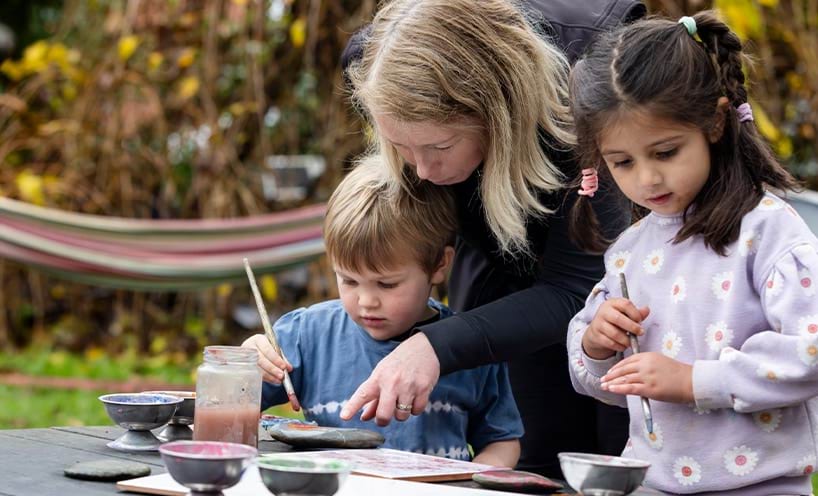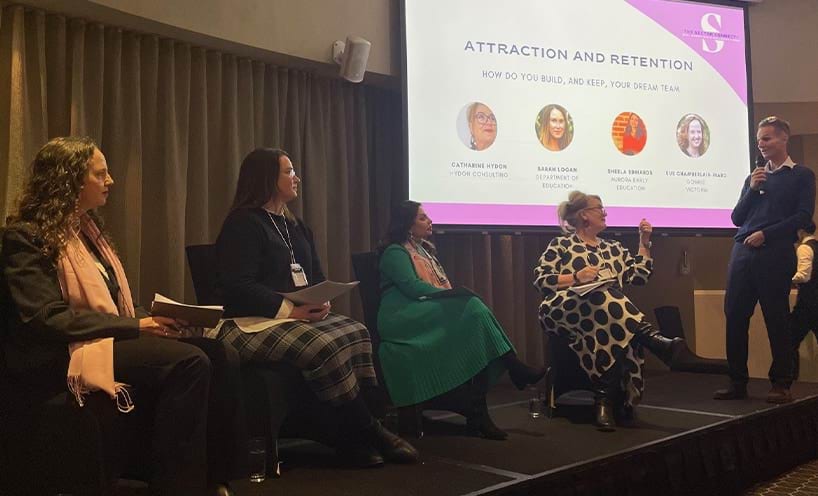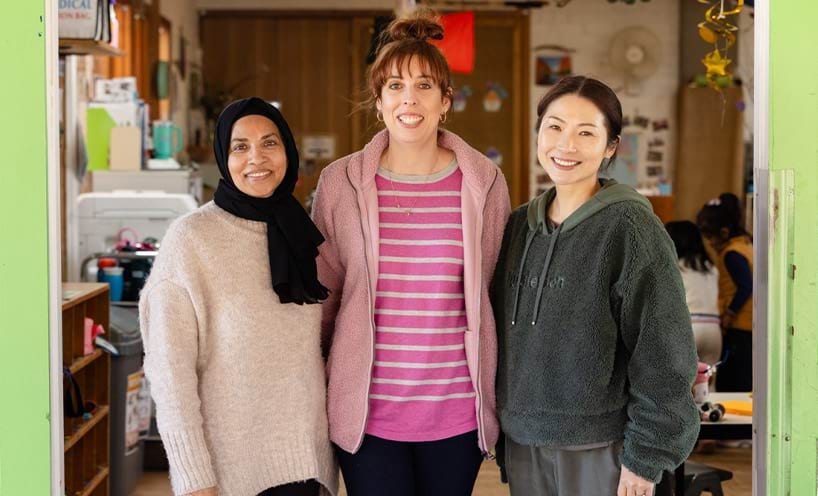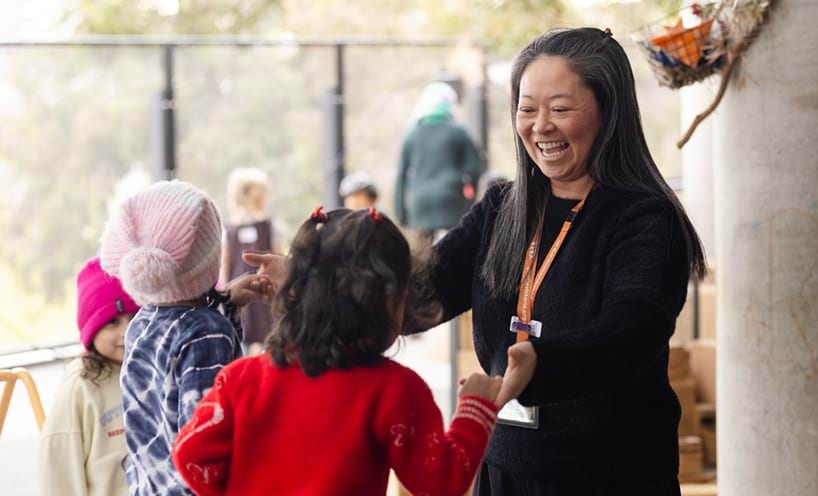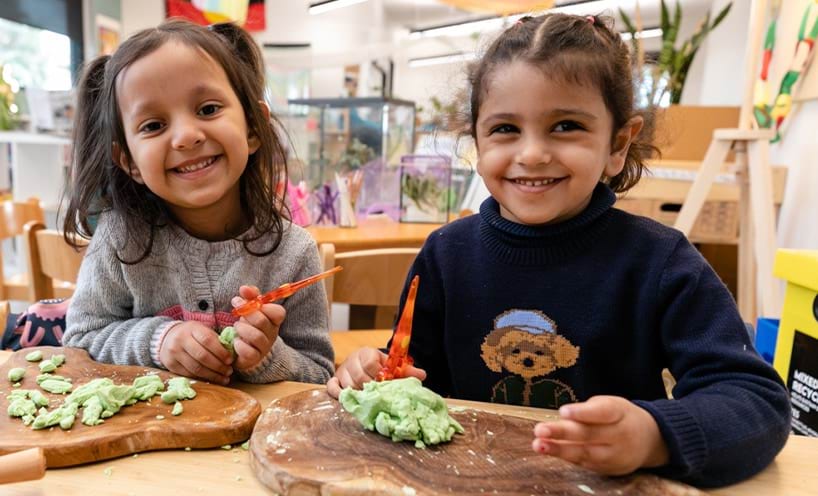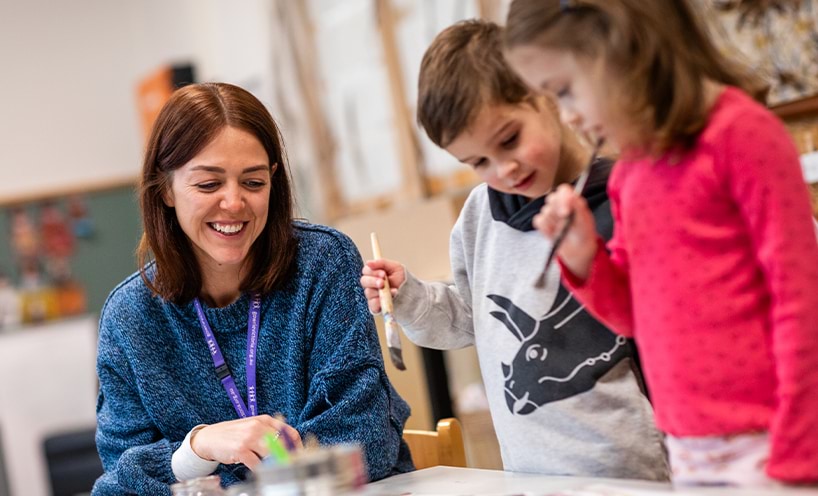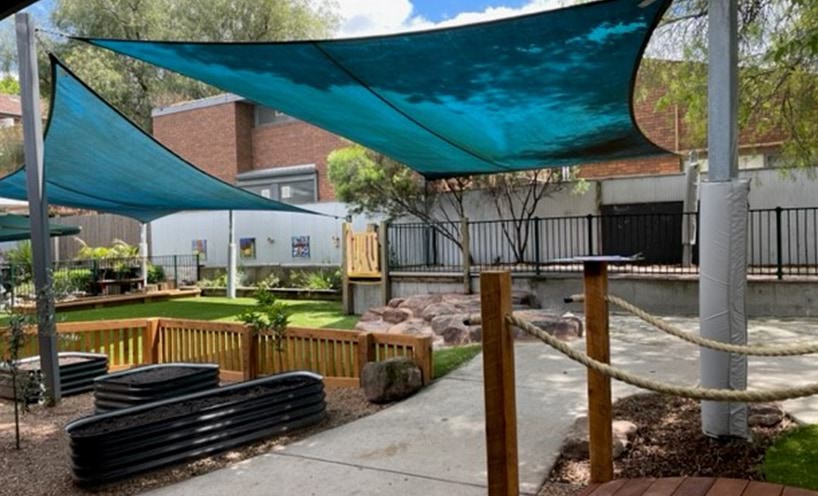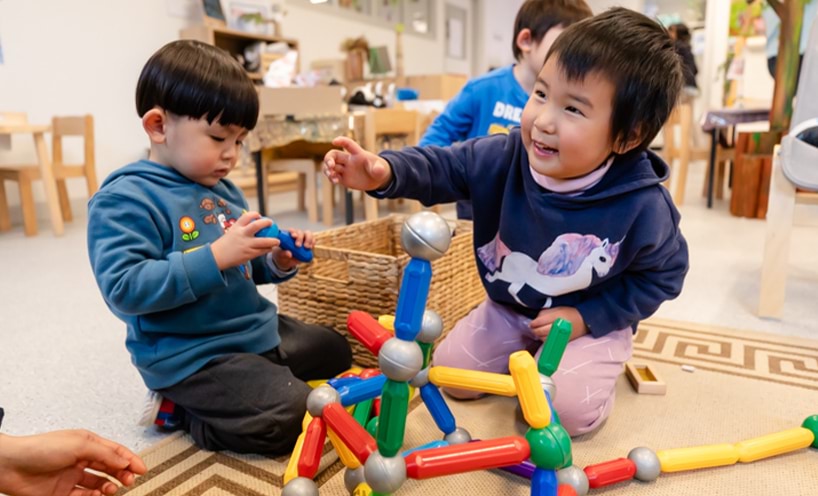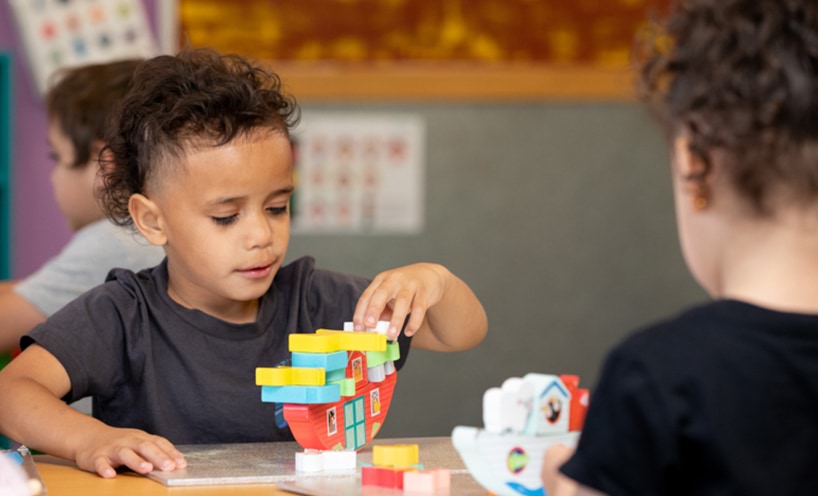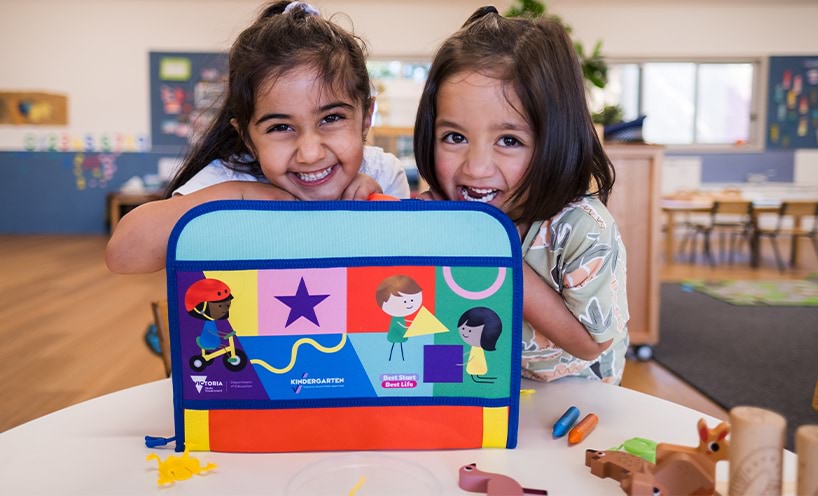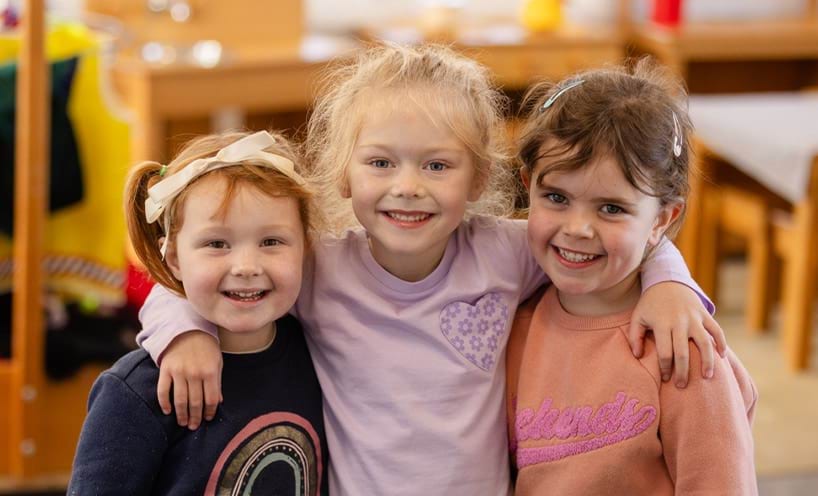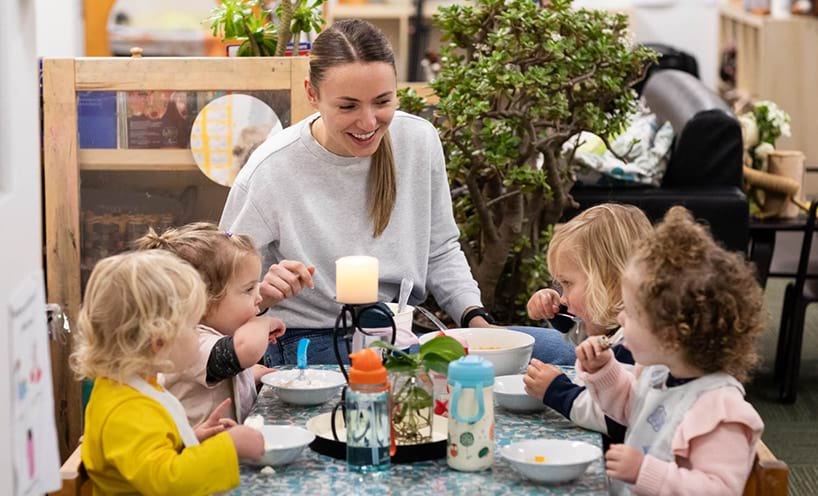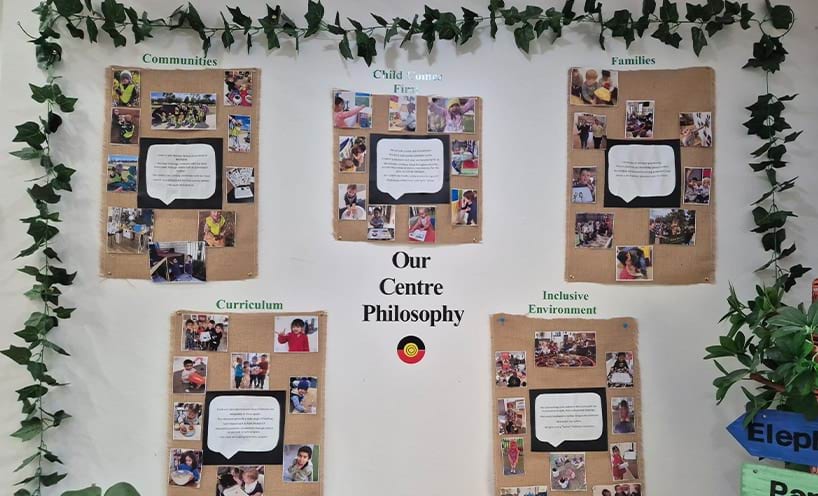- Published by:
- Department of Education
- Date:
- 8 Aug 2025
The Early Childhood Update e-newsletter is sent to early childhood teachers and workers, but is open to anyone interested in best practice in early years education and evidence-based teaching approaches. Subscribe here to receive the e-newsletter(opens in a new window).
Fresh safety measures across the early childhood sector
Critical work continues to improve the safety and wellbeing of children in early childhood education and care.
Dear colleagues
Through this time when significant attention is on quality and safety in the early childhood education and care (ECEC) sector, I want to acknowledge the professionalism you bring to work each day and thank you for your ongoing commitment to the safety and wellbeing of children in your care.
I would like to highlight some recent information we’ve shared directly with services.
As you would be aware, a Rapid Child Safety Review is now underway to identify the immediate actions that can be taken to improve the safety of children in ECEC settings. This Review will be completed by Friday 15 August 2025 and we’ll have more information to share after this time.
In addition, the Early Childhood Workforce Register is now live, and requires Victorian Government-funded ECEC services to record information on all employees at the service who have regular contact with children. Services have until Friday 29 August 2025 to update the register. You can find out more about the register, including Frequently Asked Questions.
Please be reminded that anyone with concerns about the safety of children in early childhood services should call the Regulatory Authority (QARD) on 1300 307 415. Reports can be made anonymously. All notifications are taken seriously and investigated.
As communicated in our July update, a dedicated phone line is available to provide wellbeing support to teachers, educators and other staff at all Victorian early childhood services. Staff can access professional and confidential support through TELUS Health by calling 1800 971 573. Please share this information with your services and staff.
Meanwhile, Early Childhood Educators’ Day on Wednesday 3 September is an important opportunity to acknowledge the vital work educators do every day. We encourage you to start thinking about how your service might mark the occasion and recognise your team. You’ll find ideas and resources in the article Early Childhood Educators' Day.
You’ll also find a range of other resources and opportunities in this edition, including:
- our Early Childhood Workforce Retention Guide and how it can support service leaders with retention efforts
- how improvements to our Transition Learning and Development Statements make completing them faster and easier, helping the transition to primary school
- information sharing resources and training on your Multi-Agency Risk Assessment and Management reforms obligations
- how to apply for the latest round of Building Blocks grants, supporting services with facility upgrades and new equipment
- an updated resource to help services promote early childhood education to Aboriginal and Torres Strait Islander families.
I hope you find this information helpful in your work supporting children and families across Victoria — and that it helps you stay informed and supported.
Bronwen FitzGerald
Deputy Secretary
Early Childhood Education
Early Childhood Workforce Register
Service providers receiving kindergarten funding must update the Early Childhood Workforce Register by 29 August 2025.
The Victorian Government has introduced the Early Childhood Workforce Register (Workforce Register) as part of Victoria’s response to the recent child safety issues in childcare.
The Workforce Register will be delivered using the existing mandatory kindergarten data reporting system, Arrival, in this first phase of implementation. The Arrival system will expand the information and range of workers it collects data on through a 'census' model.
The Workforce Register applies to services that offer a funded kindergarten program and already use Arrival. It will require services to:
- record information in Arrival about all current employees at the service who have direct contact with children as part of their duties. This includes staff who do not work with kindergarten children (for example, staff working with zero to 2-year-olds), and non-teaching or educator staff who have direct contact with children (for example, cooks)
- provide a small amount of additional data on teachers and educators already registered in the system who deliver a funded kindergarten program.
Service providers who receive kindergarten funding must update the Early Childhood Workforce Register by Friday 29 August 2025.
Services need to enter this information for current employees only and will be required to update the Workforce Register quarterly. All casual staff employed by the service that have direct contact with children as part of their usual duties will need to be entered into the Workforce Register. Services will not be required to enter information on agency staff, third-party contractors or visitors in this first phase.
Further work is underway on the approach to other regulated early childhood education and care services, including long day care and kindergarten services not receiving kindergarten funding, outside school hours care, family day care as well as occasional care. Information about agency staff will also be collected quarterly as part of the next stage of implementation.
Find out more
For the latest information, including Frequently Asked Questions, refer to Early Childhood Workforce Register.
Guidance on how to update the Workforce Register is available in Arrival Help.
For technical support when updating the Workforce Register, contact the Arrival Helpdesk:
For further enquiries about the Workforce Register or Arrival, contact the Arrival Implementation team by email: arrival.implementation@education.vic.gov.au(opens in a new window)
Early Childhood Education and Care Connect+ Workforce and Wellbeing Forum
The event brought early childhood education professionals from across the state together to explore workforce and wellbeing topics.
The Early Childhood Education and Care (ECEC) Workforce and Wellbeing Forum was held on Thursday 17 July 2025.
The Sector(opens in a new window) event, supported by the department and Goodstart Early Learning, brought together almost 250 ECEC professionals from across the state to share their experience, knowledge and insights. Attendees included professionals from not-for-profit and community organisations, policy experts and service leaders.
Structured around 4 key themes, the forum focused on:
- the ECEC workforce policy environment — how the policy is evolving, Free TAFE and skilled migration pathways
- workforce attraction, recruitment and retention — the importance of culture, capability alignment, recruitment strategies and expectation setting
- educator wellbeing — examples of wellbeing programs and practices and how to succeed in this area
- a reflective conversation with Myra Geddes, the social impact general manager at Goodstart Early Learning, her journey and lessons learned.
Throughout the day, participants had opportunities to network and build professional relationships. They came away with new ideas to strengthen their own practice and services.
Panelist Sarah Logan, Director Workforce Policy and Programs at the department, said ‘it was a privilege to spend a day with so many committed and professional members of the broader ECEC community.’
‘Investing in the workforce is critical to high quality early childhood education and care and this was a fantastic opportunity to share knowledge and build connections’.
The Sector founder and chief executive officer Jason Roberts said hosting a ‘high quality field of panelists’ was ‘tremendously humbling’.
‘The breadth of topics of covered, the insights shared and the experience on display was clearly well received by our delegates, many of which had travelled interstate to attend.’
Find out more
For more information on professional development and career support, refer to the Career opportunities and support(opens in a new window) webpage.
Early Childhood Educators' Day
Celebrate the vital work educators do every day to shape young minds, spark curiosity and make learning fun, on 3 September 2025.
Early Childhood Educators’ Day is an opportunity to acknowledge the incredible work educators do to support children’s learning and development.
This year, the national celebration takes place on Wednesday 3 September 2025. We encourage all services to get involved and recognise and thank their team.
How to celebrate
There are many simple and meaningful ways you can mark the day and get families and children involved, including:
- add your service to the map of services taking part in the day
- organise an activity or morning tea
- put up posters in your communal areas to let your families and team know the day is coming up
- put a notice to families in your email newsletter
- post the ‘How are you going to say thank you?’ video on social media
- encourage children and their families to do something special like making a homemade card, contributing to a communal appreciation wall or dressing up for the day.
For more celebration ideas and resources, visit Early Childhood Educators’ Day.
Share stories of your educators
If you have a story you’d like to share about an educator at your service and the impact of their work, get in touch with our communications team using the email address below.
We’ll promote their story as part of our Early Childhood Educators’ Day celebrations, or in a future edition.
Find out more
For more information, refer to Early Childhood Educators’ Day.
For further enquiries, or to share stories, contact the department by email: ec.portfolio.communications@education.vic.gov.au
Using the Early Childhood Workforce Retention Guide
Our guide includes service-level strategies and practices to support workforce wellbeing and improve staff retention.
The Early Childhood Workforce Retention Guide is aimed at all types of early childhood education and care (ECEC) providers. It supports service leaders to reflect on current retention efforts and consider opportunities to strengthen their workforce planning.
The benefits of workforce retention are well understood. Well-staffed teams create positive environments that reduce burn-out and increase wellbeing and trust. A stable workforce supports strong relationships with parents, families and most importantly, continuity of care and learning for children.
Retention also helps services operate more efficiently and effectively and contributes to financial stability by reducing costs associated with recruitment, backfilling staff and onboarding new employees.
Supporting workforce planning
The guide brings together contemporary Australian and international research and case studies from a range of Victorian ECEC services, and includes information on:
- the benefits of improving workforce retention efforts
- the 4 key elements that support workforce wellbeing and retention: skilled and supported leaders, positive workplace culture, defined role expectations, and effective systems and processes
- practical strategies to consider when thinking about improving retention
- a directory of resources to help services take action.
While there is no ‘one-size-fits-all’ approach, service leaders are encouraged to reflect on the strategies and practices outlined in the guide and consider how they might be relevant to their local circumstances and complement existing efforts.
Find out more
To access the guide, refer to: Early Childhood Workforce Retention Guide(opens in a new window).
For further information, refer to the Early Childhood Induction Toolkit.
2025 Annual Kindergarten Census
All funded kindergarten services must enter their attendance data in the Kindergarten Information Management System by 19 September 2025.
This year, the census reference week was held from Monday 28 July to Friday 1 August. All funded kindergarten services were required to collect attendance data during this period.
To support approved providers who are currently focusing on entering information into the new Early Childhood Workforce Register, the department is providing additional flexibility for census completion.
Census will now open in the Kindergarten Information Management System (KIMS) on Monday 11 August 2025 with the extended completion date of Friday 19 September 2025.
Submission of census is a requirement of receiving kindergarten funding regardless of the kindergarten program type or delivery model.
Services will be required to enter:
- attendance details for each child enrolled
- information on fees paid during the census week
- name of person who entered the details.
We will use information from the census to inform policy and reporting requirements, including reporting on benchmarks included in the Preschool Reform Agreement.
The department will send guidelines and instructions on how to complete the census in KIMS to all eligible service providers.
Find out more
For further enquiries, contact your local Early Childhood Improvement Branch.
Early Years Assessment and Learning Tool mid-year intake
Apply by 29 August 2025 to gain access and help teachers and educators at your service better understand children’s unique strengths, interests and abilities.
Applications are open for services to access the Early Years Assessment and Learning Tool (EYALT), as part of our mid-year intake.
The EYALT is an online resource developed with early childhood teachers to help improve their understanding of individual children’s strengths, interests, and abilities and how best to support their learning. It is a useful resource for all early childhood professionals, both new and experienced.
The EYALT supports early childhood teachers by:
- documenting interactions to understand each child better
- showing how children progress in their learning
- fitting into everyday teaching practices
- improving observations and assessments for intentional teaching
- providing evidence to support discussions with school teachers
- supporting smooth transitions for children starting school.
More than 1,000 kindergarten services across Victoria are using EYALT as part of their planning and assessment practice.
Support package
Services new to the EYALT receive a support package. This includes:
- a flexible grant of $3,150 to support activities required to implement and embed use of the EYALT in the early years planning cycle
- access to a range of EYALT-specific professional learning events and resources
- dedicated practice support through kindergarten improvement advisors in your area
- written guidance and technical support, including instructional videos on the EYALT.
How to apply
Applications are open to approved providers and close Friday 29 August 2025.
For more information and to apply, refer to the EYALT webpage(opens in a new window).
Find out more
For further enquiries, contact the Assessment for Learning team by email: early.years.assessment@education.vic.gov.au(opens in a new window)
Applications open for Building Blocks Inclusion grants
Upgrade early childhood buildings and facilities to make them more accessible and inclusive for children of all abilities.
Applications for Building Blocks Inclusion grants are now open to help you upgrade early childhood buildings or purchase equipment to provide safe, more inclusive and accessible environments for all children.
There are 2 categories of grants under the Building Blocks Inclusion stream:
- Buildings and playgrounds: grants of up to $200,000 (excluding GST) to make kindergartens more inclusive and accessible to children of all abilities.
- Equipment: grants of up to $10,000 (excluding GST) for moveable inclusive education equipment, such as mobility stools and sensory equipment for kindergarten programs.
Creating accessible play areas
In 2023, Yarra Park Children's Centre and Kindergarten(opens in a new window) successfully applied for funding to upgrade its outdoor play area through the Building Blocks Inclusion grants buildings and playgrounds category.
Works included installing a ramp and replacing dirt areas with decking to make the outdoor areas more accessible. The new playground also has more open play spaces and an upgraded sandpit, making it easier for more children to play at the same time.
How to apply
Applications for equipment grants are open until midnight Monday 25 August 2025.
Applications for buildings and playgrounds grants are open until midnight Monday 22 September 2025.
For details on how to apply, visit Building Blocks Grants – Inclusion(opens in a new window).
Find out more
For more information, visit Building Blocks Grants – Inclusion(opens in a new window)
For further enquiries, contact the Victorian School Building Authority’s Early Childhood Grants team by email: building.blocks@education.vic.gov.au(opens in a new window)
Information sharing and MARAM reforms
Access updated resources and the Child Link system and complete training to build your understanding of the reforms.
The information sharing schemes and Multi-Agency Risk Assessment and Management (MARAM) reforms enable early childhood services to share information to promote the wellbeing or safety of children and identify and respond to family violence.
In response to feedback from stakeholders, we have updated our information sharing and family violence reforms guidance and tools. This will support services to share information confidently, safely and appropriately, improving children’s wellbeing and safety.
The resources will also support services to identify and respond to family violence in a safe and consistent way. Resources include:
- new chapters to help service leaders, all staff and nominated staff meet their service’s legislated MARAM responsibilities
- new downloadable templates and tools, including tools that help all staff to identify family violence and nominated service staff to screen for family violence and make basic safety plans
- revised chapters on implementing the information sharing schemes.
The tools support the work service staff already do to respond to family violence.
MARAM nominated staff and training
To help meet your service’s legislated MARAM responsibilities, we recommend service leaders identify up to 3 MARAM nominated staff (depending on the size of the service) who will be responsible for family violence screening, safety planning and making referrals and reports.
We recommend MARAM nominated staff attend new training, outlined below, to understand and action their MARAM responsibilities.
Training details
Dates: training sessions are available until the end of Term 2, 2026
Time: 4 hours. Training hours count towards professional learning for Victorian Institute of Teaching registration
Platform: face-to-face and online options are available, along with specific Early Childhood-only sessions
Cost: free. Casual relief teacher reimbursement is available. Instructions to claim reimbursement are available upon training registration.
For more information and to register for training, refer to Non-accredited MARAM training (Education workforces) on the Training for the information sharing and MARAM reforms webpage.
Information Sharing and Child Link
The Child Information Sharing Scheme(opens in a new window) (CISS) makes it easier for education professionals to request and share information with other organisations to promote the wellbeing and safety of children.
The Child Link system is a digital tool that displays information about a child and their participation in key early childhood and education services. Child Link is a key enabler of CISS.
Both Child Link and CISS are designed to enhance the valuable work early childhood services already do to promote children’s wellbeing and safety by supporting professionals to see the full picture. Together, CISS and Child Link can support you to:
- make more informed decisions about the wellbeing, safety, and support needs of a child in your service
- better identify risks and vulnerabilities and provide support to prevent any escalation of harm
- encourage cross-service collaboration to facilitate more holistic support around a child
- provide support earlier by linking information from across schools and services
- facilitate smoother transitions between early childhood and education services by responding to gaps in participation.
For more information about Child Link and how to access it, refer to the Child Link : A Guide for Early Childhood Providers.
Find out more
To access training on information sharing for education workforces, refer to Information sharing training (Education workforces) on the Training for the information sharing and MARAM reforms webpage.
For further enquiries, contact the Information Sharing and MARAM enquiry line:
- phone: 1800 549 646
- email: cisandfvis@education.vic.gov.au
For more information on CISS and Child Link, refer to:
- Information Sharing and Family Violence Reforms – Guidance and Tools
- Child Link
- Child Information Sharing Scheme.
For further enquiries, contact the Whole of Victorian Government Information Sharing and MARAM Enquiry Line:
- phone: 1800 549 646
- email: CISandFVIS@education.vic.gov.au
Updated Koorie Kids Shine communications resource
Use our resource kit to help promote early childhood education to Aboriginal and Torres Strait Islander families.
The department has released the Koorie Kids Shine Communications Kit, an updated resource to support services in promoting early childhood education to Aboriginal and Torres Strait Islander families.
The kit includes adaptable content such as social media tiles, posters, newsletter copy, and images that reflect Koorie culture and community. These materials are designed to support culturally safe, inclusive communication about Free Kinder, Pre-Prep, and the importance of early learning.
Services can use the kit to:
- celebrate Koorie culture in communication materials
- strengthen relationships with Koorie families
- increase awareness and participation in early childhood programs.
All services are encouraged to use the kit, regardless of current enrolment numbers, to support inclusive and welcoming environments.
Find out more
To download the kit, refer to: Koorie Kids Shine.
For enquiries or suggestions, email: ec.portfolio.communications@education.vic.gov.au
Collection of surplus Kinder Kits
Services with 4 or more spare kits should contact the department.
This year, we delivered more than 75,000 Kinder Kits to more than 3,000 early childhood education services across Victoria.
Thank you for supporting this initiative and distributing the Kits to eligible children at your service. The Kits have given families a valuable opportunity to support their children’s learning and development through play.
We are now collecting spare Kinder Kits from services with 4 or more surplus Kits.
If your service ordered more than required, the department would love to hear from you.
Send us your surplus stock
If you have surplus Kits to return to the department, please complete the Kinder Kit 2025 Return Surplus Stock form. Our contracted suppliers, Bao&Co will then arrange for the Kits to be collected.
We are only calling for a return of Kits from services with 4 or more surplus.
If your service has up to 3 spare Kits, please keep them for late enrolments. This will help to reduce emissions from collecting small numbers of Kits and ensure timely distribution.
Large service providers should redistribute any spare Kits across your services where needed.
Find out more
For more information about 2025 Kinder Kits, including Auslan translations of the 2025 books, refer to Kinder Kits.
For further enquiries, contact the department by email: kinder.kits@education.vic.gov.au
Improvements make Transition Learning and Development Statements faster and easier, helping the transition to primary school
Find out how you can streamline the transition to primary school by using information gathered through the Early Years Assessment and Learning Tool.
All funded kindergarten providers are required to prepare a Transition Learning and Development Statement for every child enrolled in their service who will be transitioning to primary school in 2026.
The Transition Statement plays a crucial role in summarising each child’s strengths, learning styles and development. It’s designed to ensure that the transition into primary school is smooth, seamless, and supports continued growth in their learning journey.
Thanks to the Online Transition Statement tool, hosted on the Insight Assessment Platform, kindergarten teachers can easily complete and send Transition Statements directly to the child's school, where it can be linked to their school profile.
Transition Statements are used by Foundation teachers to quickly develop a holistic picture of the child's learning and development and the strategies that are most effective to support their learning. They help teachers enhance how they support children’s learning and provide a positive start to their schooling.
We’ve recently enhanced the Online Transition Statement tool to make it more user-friendly and intuitive. Plus, if you’re using the Early Years Assessment and Learning Tool (EYALT), you now have access to a handy EYALT Transitions Report, which streamlines the process by auto-filling Section 1.1 of the Transition Statement. This means less time spent on paperwork, and more time focusing on what matters most: the children’s learning and development.
This report will contain:
- an introduction to the EYALT modules and how they map to the Victorian Early Years Learning and Development Framework outcomes
- a profile report, which depicts a child’s level of learning and progress in each of the EYALT modules completed for that child
- intentional teaching and learning strategies, which lists relevant strategies for that child to support their continuity of learning and development into primary school.
Implementation guidance is also available to support teachers in this process.
If your services is interested in signing up to use the EYALT, please visit Early Years Assessment and Learning Tool (EYALT).
Find out more
For more information about accessing updated guidance materials and professional learning for the Online Transition Statement tool, refer to: Complete an online Transition Learning and Development Statement.
To access free professional learning on completing the Transition Statement, refer to Professional learning to support transition to school.
For more information about accessing updated guidance materials and professional learning for the EYALT, refer to: Early Years Assessment and Learning Tool.
For further enquiries, contact the department by email: early.years.transition@education.vic.gov.au
Supports for early career teachers and educators
Register to take part in the End-to-End Program Communities of Practice.
The End-to-End Career Supports Program is open for registrations for early-career teachers and diploma-qualified educators in their first 5 years of practice.
The fully funded professional support program gives teachers and educators an opportunity to receive one-on-one coaching or join a Community of Practice (CoP). It allows participants to explore problems of practice and meet other early childhood professionals.
Service leaders supporting staff participation in this program will benefit from:
- enhanced staff expertise and confidence in leading kindergarten programs, leading to better child learning outcomes (National Quality Standard 1)
- improved staff retention and job satisfaction (National Quality Standard 4)
- cultivation of a learning culture within the workplace, fostering continuous development (National Quality Standard 4)
- increased organisational credibility, establishing the service as a leader in delivering high-quality education (National Quality Standard 7).
Communities of Practice
Registrations for Term 3, 2025 CoPs are now open.
The CoP consists of a series of 2 three-hour sessions throughout Term 3, focused on building professional identity and partnership with colleagues.
Early childhood teachers and educators in their third to fifth year of practice and working in a funded kindergarten program are eligible to take part in the online sessions.
The sessions are a chance to connect with peers who understand the challenges and opportunities of early career teaching and talk honestly about what it takes to stay committed in a demanding but rewarding profession.
Each session is designed around reflection, leadership, collaboration, and innovation, giving educators the time to test new strategies and return to reflect and refine.
The sessions are facilitated by experienced professionals and based on adult learning theory. They will ensure an atmosphere that fosters psychological safety and honest dialogue.
By the end, participants walk away with a stronger sense of professional identity, practical skills, and sense of belonging.
To register to take part, visit: Supports for early career early childhood professionals.
Find out more
For more information, refer to End-to-End Career Supports Program.
The journey to excellence
How Melton Montessori Early Learning Centre created lasting change for children, families and staff and inspired others.
In 2024, Melton Montessori Early Learning Centre was awarded the Excellent rating by the Australian Children’s Education and Care Quality Authority — the highest a service can achieve under the National Quality Framework.
The service was recognised for celebrating culture and diversity, fostering inclusive partnerships and creating a positive environment that supports children’s learning and growth.
Transforming their practice
In 2018, the service was rated Working Towards, facing challenges including low compliance, limited resources and low staff morale.
Leadership changes in 2019 helped shift the focus towards educator wellbeing and quality programming.
A gradual move towards Montessori-inspired practices brought new energy to the service. This led to new projects including Bush Kinder, cultural festivals, daily walks and staff outings. These changes helped to strengthen staff collaboration and family engagement. The service also introduced new community engagement programs, such as a Clothing Exchange Program.
Educators and children co-developed inclusion guidelines and created a music video and other resources to promote the centre’s values.
Fowzia Issa, centre director, said the team faced challenges along the way including resistance to change, COVID-19 pressures and compliance reform.
‘To stay on track, leadership focused on clear communication, shared goals and allowed space for educators to try new ideas,’ she said.
‘This ensured staff felt valued and re-engaged with their roles’.
Sharing their success
The changes at Melton Montessori caught the attention of the Brimbank Melton Early Childhood Improvement Branch, who asked the centre to present on their journey to the wider early childhood sector at the local Early Learning Leaders forum. After this, other local centres started reaching out to learn from their journey. The team welcomed visits from centre leaders and openly shared their strategies and everyday practices.
Fowzia said feedback from these visits has been overwhelmingly positive.
‘Many services described feeling energised and reassured after their visits — seeing firsthand that meaningful improvement is possible with persistence, clear values, and team collaboration,’ she said.
The centre has evolved into a hub for mentoring, particularly through the Bush Kinder program, where educators share insights on nature-based learning.
Looking ahead
The service is preparing for its next big step —the rollout of Pre-Prep for priority cohorts from 2026.
‘The change management practices developed throughout the assessment and rating journey have created a strong, flexible structure to support this growth,’ Fowzia said.
The centre has started planning to expand its capacity while maintaining the quality of care, strengthen transition programs and deepen engagement with families.
Find out more
For more information, refer to Melton Montessori Early Learning Centre.
For more information about the Pre-Prep rollout, refer to the Pre-Prep roll-out schedule.
